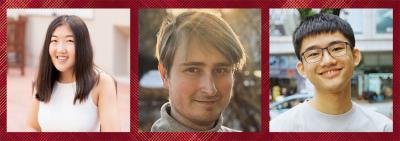Author
Marylee Williams
Three SCS Students Named 2026 Siebel Scholars

Three graduate students in Carnegie Mellon University's School of Computer Science have been named 2026 Siebel Scholars. Conrad Borchers, Michelle Zhao and Thomas (Hanwen) Zhu will each receive $35,000 toward their final year of graduate studies.
Now in its 25th year, the Siebel Scholars program recognizes exceptional students from the world's leading graduate schools of business, computer science and bioengineering. This year, 78 students were selected as part of the class of 2026. This talented group of students brings together diverse perspectives to influence the technologies, policies, and economic and social decisions that shape the future.
Founded in 2000 by the Thomas and Stacey Siebel Foundation, the Siebel Scholars program awards grants to students at 16 universities in the United States, China, France, Italy and Japan.
"Every year, the Siebel Scholars continue to impress me with their commitment to academics and influencing future society. This year's class is exceptional, and once again represents the best and brightest minds from around the globe who are advancing innovations in healthcare, artificial intelligence, financial services and more," said Thomas M. Siebel, chair of the Siebel Scholars Foundation. "It is my distinct pleasure to welcome these students into this ever-growing, lifelong community, and I personally look forward to seeing their impact and contributions unfold."
Zhao's work focuses on human-robot collaboration. Currently, humans can teach robots through varied forms of feedback, but the burden of responsibility rests on the human to understand what the robot does or doesn't know. Zhao, a doctoral student in the Robotics Institute, develops ways for robots to detect their own uncertainty and request targeted guidance from users. Her work aims to diagnose the source of uncertainty to help the user correct the robot's incorrect or erroneous behavior. She hopes to make robots active partners in learning, capable of understanding and communicating their uncertainty so they can better align with human needs over time.
Borchers, a Ph.D. student in the Human-Computer Interaction Institute, designs methods to help students persist and thrive in science, technology, engineering and mathematics contexts. He has created human-centered AI systems that can help students set goals and manage their workload in K-12 and higher education. His studies in local middle schools have shown that these goal-setting tools can boost student mathematics proficiency. He hopes to deliver personalized goal-recommendation and feedback tools that use real-time learning data to help students set, revise and reflect on weekly learning goals. He sees AI as a tool to improve motivation and agency, supporting learning rather than replacing it.
Zhu said his research aims to automate the mathematical discovery process. The master's student in the Machine Learning Department studies how large language models (LLMs) with reasoning ability can be combined with interactive tools that verify mathematical proofs to solve complex math problems. His future research projects will focus on building the inference-time algorithms and infrastructure to apply LLMs to research-level mathematics. He said most current research around applying LLMs to math is applied to high-school math competitions. He hopes to improve these tools to solve open problems.
Learn more about the Siebel Scholars program and this year's other scholars on the Siebel Scholars Foundation website.
For More Information
Aaron Aupperlee | 412-268-9068 | aaupperlee@cmu.edu
Related People
Conrad Borchers

